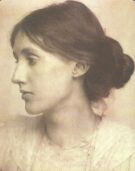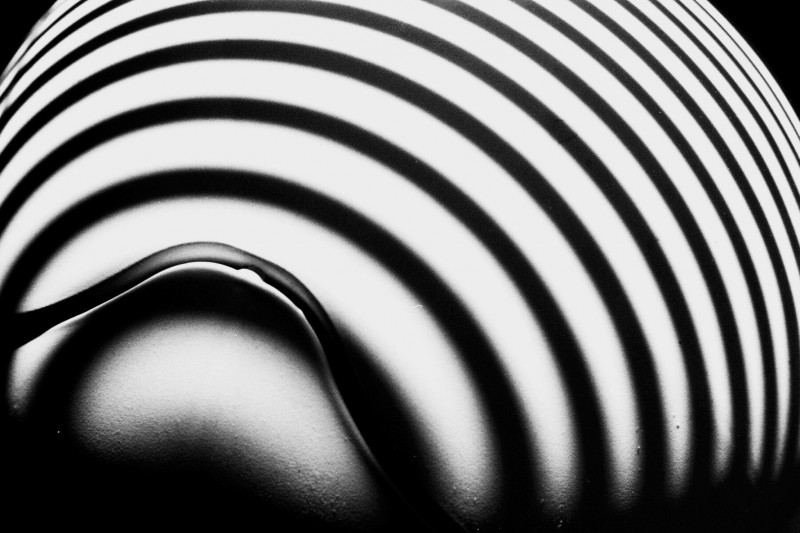“The Great Frost” from Orlando by Virginia Woolf is reprinted with permission by Project Gutenberg.
The Great Frost was, historians tell us, the most severe that has ever visited these islands. Birds froze in mid-air and fell like stones to the ground. At Norwich a young countrywoman started to cross the road in her usual robust health and was seen by the onlookers to turn visibly to powder and be blown in a puff of dust over the roofs as the icy blast struck her at the street corner. The mortality among sheep and cattle was enormous. Corpses froze and could not be drawn from the sheets. It was no uncommon sight to come upon a whole herd of swine frozen immovable upon the road. The fields were full of shepherds, ploughmen, teams of horses, and little bird-scaring boys all struck stark in the act of the moment, one with his hand to his nose, another with the bottle to his lips, a third with a stone raised to throw at the ravens who sat, as if stuffed, upon the hedge within a yard of him. The severity of the frost was so extraordinary that a kind of petrifaction sometimes ensued; and it was commonly supposed that the great increase of rocks in some parts of Derbyshire was due to no eruption, for there was none, but to the solidification of unfortunate wayfarers who had been turned literally to stone where they stood. The Church could give little help in the matter, and though some landowners had these relics blessed, the most part preferred to use them either as landmarks, scratching-posts for sheep, or, when the form of the stone allowed, drinking troughs for cattle, which purposes they serve, admirably for the most part, to this day.
But while the country people suffered the extremity of want, and the trade of the country was at a standstill, London enjoyed a carnival of the utmost brilliancy. The Court was at Greenwich, and the new King seized the opportunity that his coronation gave him to curry favour with the citizens. He directed that the river, which was frozen to a depth of twenty feet and more for six or seven miles on either side, should be swept, decorated and given all the semblance of a park or pleasure ground, with arbours, mazes, alleys, drinking booths, etc. at his expense. For himself and the courtiers, he reserved a certain space immediately opposite the Palace gates; which, railed off from the public only by a silken rope, became at once the centre of the most brilliant society in England. Great statesmen, in their beards and ruffs, despatched affairs of state under the crimson awning of the Royal Pagoda. Soldiers planned the conquest of the Moor and the downfall of the Turk in striped arbours surmounted by plumes of ostrich feathers. Admirals strode up and down the narrow pathways, glass in hand, sweeping the horizon and telling stories of the north-west passage and the Spanish Armada. Lovers dallied upon divans spread with sables. Frozen roses fell in showers when the Queen and her ladies walked abroad. Coloured balloons hovered motionless in the air. Here and there burnt vast bonfires of cedar and oak wood, lavishly salted, so that the flames were of green, orange, and purple fire. But however fiercely they burnt, the heat was not enough to melt the ice which, though of singular transparency, was yet of the hardness of steel. So clear indeed was it that there could be seen, congealed at a depth of several feet, here a porpoise, there a flounder. Shoals of eels lay motionless in a trance, but whether their state was one of death or merely of suspended animation which the warmth would revive puzzled the philosophers. Near London Bridge, where the river had frozen to a depth of some twenty fathoms, a wrecked wherry boat was plainly visible, lying on the bed of the river where it had sunk last autumn, overladen with apples. The old bumboat woman, who was carrying her fruit to market on the Surrey side, sat there in her plaids and farthingales with her lap full of apples, for all the world as if she were about to serve a customer, though a certain blueness about the lips hinted the truth. ‘Twas a sight King James specially liked to look upon, and he would bring a troupe of courtiers to gaze with him. In short, nothing could exceed the brilliancy and gaiety of the scene by day. But it was at night that the carnival was at its merriest. For the frost continued unbroken; the nights were of perfect stillness; the moon and stars blazed with the hard fixity of diamonds, and to the fine music of flute and trumpet the courtiers danced.
Orlando, it is true, was none of those who tread lightly the corantoe and lavolta; he was clumsy and a little absentminded. He much preferred the plain dances of his own country, which he danced as a child to these fantastic foreign measures. He had indeed just brought his feet together about six in the evening of the seventh of January at the finish of some such quadrille or minuet when he beheld, coming from the pavilion of the Muscovite Embassy, a figure, which, whether boy’s or woman’s, for the loose tunic and trousers of the Russian fashion served to disguise the sex, filled him with the highest curiosity. The person, whatever the name or sex, was about middle height, very slenderly fashioned, and dressed entirely in oyster-coloured velvet, trimmed with some unfamiliar greenish-coloured fur. But these details were obscured by the extraordinary seductiveness which issued from the whole person. Images, metaphors of the most extreme and extravagant twined and twisted in his mind. He called her a melon, a pineapple, an olive tree, an emerald, and a fox in the snow all in the space of three seconds; he did not know whether he had heard her, tasted her, seen her, or all three together. (For though we must pause not a moment in the narrative we may here hastily note that all his images at this time were simple in the extreme to match his senses and were mostly taken from things he had liked the taste of as a boy. But if his senses were simple they were at the same time extremely strong. To pause therefore and seek the reasons of things is out of the question.)… A melon, an emerald, a fox in the snow–so he raved, so he stared. When the boy, for alas, a boy it must be–no woman could skate with such speed and vigour—swept almost on tiptoe past him, Orlando was ready to tear his hair with vexation that the person was of his own sex, and thus all embraces were out of the question. But the skater came closer. Legs, hands, carriage, were a boy’s, but no boy ever had a mouth like that; no boy had those breasts; no boy had eyes which looked as if they had been fished from the bottom of the sea. Finally, coming to a stop and sweeping a curtsey with the utmost grace to the King, who was shuffling past on the arm of some Lord-in-waiting, the unknown skater came to a standstill. She was not a handsbreadth off. She was a woman. Orlando stared; trembled; turned hot; turned cold; longed to hurl himself through the summer air; to crush acorns beneath his feet; to toss his arm with the beech trees and the oaks. As it was, he drew his lips up over his small white teeth; opened them perhaps half an inch as if to bite; shut them as if he had bitten. The Lady Euphrosyne hung upon his arm.
The stranger’s name, he found, was the Princess Marousha Stanilovska Dagmar Natasha Iliana Romanovitch, and she had come in the train of the Muscovite Ambassador, who was her uncle perhaps, or perhaps her father, to attend the coronation. Very little was known of the Muscovites. In their great beards and furred hats they sat almost silent; drinking some black liquid which they spat out now and then upon the ice. None spoke English, and French with which some at least were familiar was then little spoken at the English Court.
It was through this accident that Orlando and the Princess became acquainted. They were seated opposite each other at the great table spread under a huge awning for the entertainment of the notables. The Princess was placed between two young Lords, one Lord Francis Vere and the other the young Earl of Moray. It was laughable to see the predicament she soon had them in, for though both were fine lads in their way, the babe unborn had as much knowledge of the French tongue as they had. When at the beginning of dinner the Princess turned to the Earl and said, with a grace which ravished his heart, “Je crois avoir fait la connaissance d’un gentilhomme qui vous etait apparente en Pologne l’ete dernier,’ or ‘La beaute des dames de la cour d’Angleterre me met dans le ravissement. On ne peut voir une dame plus gracieuse que votre reine, ni une coiffure plus belle que la sienne,” both Lord Francis and the Earl showed the highest embarrassment. The one helped her largely to horse-radish sauce, the other whistled to his dog and made him beg for a marrow bone. At this the Princess could no longer contain her laughter, and Orlando, catching her eyes across the boars’ heads and stuffed peacocks, laughed too. He laughed, but the laugh on his lips froze in wonder. Whom had he loved, what had he loved, he asked himself in a tumult of emotion, until now? An old woman, he answered, all skin and bone. Red-cheeked trulls too many to mention. A puling nun. A hard-bitten cruel-mouthed adventuress. A nodding mass of lace and ceremony. Love had meant to him nothing but sawdust and cinders. The joys he had had of it tasted insipid in the extreme. He marvelled how he could have gone through with it without yawning. For as he looked the thickness of his blood melted; the ice turned to wine in his veins; he heard the waters flowing and the birds singing; spring broke over the hard wintry landscape; his manhood woke; he grasped a sword in his hand; he charged a more daring foe than Pole or Moor; he dived in deep water; he saw the flower of danger growing in a crevice; he stretched his hand–in fact he was rattling off one of his most impassioned sonnets when the Princess addressed him, “Would you have the goodness to pass the salt?”
He blushed deeply.
“With all the pleasure in the world, Madame,” he replied, speaking French with a perfect accent. For, heaven be praised, he spoke the tongue as his own; his mother’s maid had taught him. Yet perhaps it would have been better for him had he never learnt that tongue; never answered that voice; never followed the light of those eyes….
 Virginia Woolf (1882-1941) was an English writer and essayist who pushed the boundaries of prose style and feminine expression in the early to middle years of the twentieth-century. Orlando is considered one of her most experimental works, employing stream of consciousness and magic realism to create an unforgettable character. (Novel Excerpt compliments of Project Gutenberg Australia.)
Virginia Woolf (1882-1941) was an English writer and essayist who pushed the boundaries of prose style and feminine expression in the early to middle years of the twentieth-century. Orlando is considered one of her most experimental works, employing stream of consciousness and magic realism to create an unforgettable character. (Novel Excerpt compliments of Project Gutenberg Australia.)


